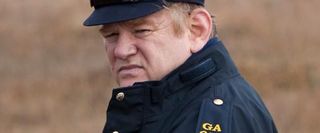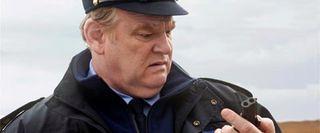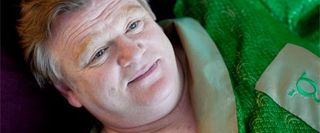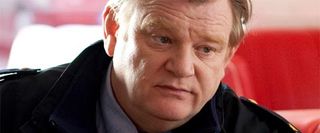Interview: The Guard's Brendan Gleeson

Back in 2008, actor Brendan Gleeson teamed up with Oscar-winning writer/director Martin McDonagh for a film called In Bruges. A brilliant dark comedy featuring incredible performances by its two leads, the film has since gained cult status and ended up winning numerous awards. Now Gleeson is back working with a McDonagh, but this time it’s with Martin’s brother John Michael who has crafted the amazingly funny The Guard.
A few weeks back I had the opportunity to sit in on a roundtable with Gleeson to discuss the new film, which comes out this Friday. Check out the interview below in which the Irish actor discusses his time working with Don Cheadle, compares and contrasts the McDonagh filmmakers, and opens up about his next project with The Guard filmmaker.
This part seems so perfect for you but it was not specifically written for you. Were you able to put your stamp on it, and what do you think that was?
I don’t know if I put my stamp on it or not or whether it was there on the page to begin with. All you’re trying to do is to realize the script and bring it into reality, so, I mean I found things out about him that I didn’t know when I started. And whether that was in there already or whether I found them because I’m warped, I don’t know.
Did he remind you of somebody or people you’ve known?
Yeah, but I couldn’t be specific about it. I meet these guys a lot. Anybody who’s ventured into the wilderness of middle age understands disillusionment, you know? I think this guy is profoundly disillusioned and I think he’s also profoundly lonely. And I mean, spoiler alert, but when his mom dies, that’s about it. He doesn’t really, nobody else gets him. And Wendell gets him for a while and then he goes. And you know, maybe he’s kind of protective of the widow, but it’s like people don’t really get him, and he’s gotten to the stage where he doesn’t care, all he wants to do is make the day go a little bit faster. So he’s less than kind to the people around him, just hoping that someone will fly off on him and make the day interesting for him.
Don said that he was really looking forward to working with you. How was the first meeting you had with Don about the movie?
CINEMABLEND NEWSLETTER
Your Daily Blend of Entertainment News
It was in LA actually, we had both decided to do it. I was really delighted when they said that it had gone out to him and I was even more delighted when he said he was going to do it. I was surprised how quickly that happened, but I was absolutely over the moon. I love his work, and I kind of felt, you can feel intuitively that there’s a kind of integrity going on there that you don’t even have to question. I kind of trusted him, you know you can be disappointed in that sometimes with people that maybe who’s work that you loved, that you didn’t like much as people, but it’s unusual. When you see the kind of a decency or something, integrity’s the best word for it that comes through in his work, I would have been surprised if I had been wrong. But then we got into, we managed to get together for an afternoon in LA about a month or two before we shot, and we had a reading through it with John, John was here as well, and we spent an afternoon kind of just testing the water and seeing how it came out. From that it was a kind of looking up all the time, we couldn’t wait to get going.

You’ve worked with both brothers, can you compare and contrast? This was really John’s first big film.
Yeah, well the way I explain to people, the comparisons, I remember saying to him, “Okay John, before this starts, before this thing starts, it’s going to be the comparison, comparison.” I told him that like, last year. And I said, “You’re going to have to find some way to get your head around that,” and he said, “No, I know, it’s not a problem.” It is kind of a problem a little bit when everybody insists that because there’s one genetic, you know, there are obviously similarities in their work in the tone and in the sense of humor, the ferocity of it. They write in a very fierce sort of way, and it’s part of the reason that they’re so brilliant, because of the vigor they put into their writing. They don’t tolerate glibness, or half-measures, or “Let’s have an entrance here for the sake of it.” They’re very tough, so that’s the common thing. But the words are completely different, the voice is completely different. And you know my easy way out of it, what I’ve come over the last while as we’ve started to bring the film out here is anyone who considers it’s pretty much the same thing, just take any character from either film, In Bruges or The Guard, and say, put it in the other one. It’s impossible. If you take Boyle and put him in In Bruges, it’s not working. It doesn’t feel right, the tonality is different, the whole voice is different. So the worlds are separate. For me they obviously have particularly high standards that are unusual, never mind in the same house. They share that and they do have kind of a fierce sense of humor, but different voices.
Is there a kind of a different comfort level when working with an Irish director?
Not necessarily. There are closer comfort levels up to a point in the sense that I knew this guy when I read him, I knew how this thing was going to be said, I knew the tone of it, I could hear it in my head already. So all of that is a great short cut. Cultural difference really is about how people channel universal feelings. It’s amazing, I find accents really interesting, you always find out so much about a person from their accent. Just things like what makes them laugh, or if you hear something in a particular accent, it can be really, really funny that makes no odds in a different one. Because you know that people who speak like that find that kind of thing funny. It’s amazing how much you can learn being culturally particular. But in the end I think Jerry’s situation is not just a purely, because he’s a cop in the west of Ireland, all the cops in the west of Ireland are like that, it’s not about that. It’s about a guy who’s caught in a rut, who has a lot to offer and isn’t being used. It’s not being used, anything that he has to give is not being given. And then you follow that through that particular cultural thing. But yeah, it’s initially great to know where it’s coming from. If it stops at that and then it becomes Patty wackery or becomes all of the wrong things that you don’t want, cutesy, all that stuff that’s kind of vacuous, that’s not anything.

That was a beautiful scene between you and Don when he was accompanying your mother dying, did you talk about it before, or your own personal experiences?
We didn’t really. It’s one of my favorite scenes in the film, and actually my mother had died the year before we did the film, so the stuff with Fionnula was particularly poignant for me, and interesting at the same time. Particularly when, she’s such a tough bird, and it allows Boyle to be kind of soft in her presence, because she’s putting on such a face in what she’s doing. You can kind of see where Boyle gets his hard face from. So for me, that strand of it was very particular because I had just gone through it, but Don had a complete understanding of what was going on. We kind of enjoyed that one, I think, if I remember correctly, we enjoyed that one without having to discuss it. We talked about it afterward. But it’s so clever some of the stuff, where he starts talking about his dad and he’s saying about how he didn’t realize at the time, it was only years later, which is kind of a way of saying, “This pain is only going to get worse.” And then he stops in mid-sentence and Don is so intelligent in that way, he’s so great and has the best intentions, and then he walks himself into a situation screaming at himself, “What am I saying here!” and all that. It’s kind of golden. I remember Jon Voigt when we were doing The General saying, there was a thing that happened where we both made the same gesture, and it just happened really kind of organically to use it, and after the take I said, “Is that gonna be too much?” and he said, “It probably will be, but that’s a gift to ourselves.” That scene was kind of a bit like that.
Would you like to play this character again if he lived?
If he lived, I don’t know we’ll have to find out.
Do you want him to have lived?
Well my answer to that is okay, I always felt that he would have in some way worked it. But when I did the walk down the pier, I found that he was really, he didn’t care. There’s a stoicism he’d reached whereby, and it wasn’t even that it was more of an emptiness. He’s asked has he any, Don says who will he contact, and he says, “I have nobody.” And he just tosses it off but that’s the reality of it. He’s just fed up with being alone, and I don’t think it’s in any way a suicide thing or a death wish or any major. But I think he’s gone beyond the state of caring, all he knows is that he wants to do, I think have been wanting confrontation like this all his life whereby he kind of steps up to the mark, he’s been always wishing for a situation whereby, because it’s so unusual in life to get a clear-cut challenge and know, okay, this is the force of God against the force of evil. It doesn’t happen like that. Mostly it happens in small compromises. People looking the other way. Not seeing what you definitely did see, or pretending not to see it, or telling yourself that you didn’t see it, or whatever it is, but a really clear cut chance to say, okay, this is either stand up or runaway time. I think he’s been wanting one of those since the time he joined the police force, and all he got was small time traffic tickets and small bribery corruptions, small stuff.

That starts when he puts on that uniform.
I think so, yeah, when he puts on that uniform I think he wants, and actually not a lot of people know this, and couldn’t be expected to know it, but the wardrobe person, we were kind of thinking, has he got a ceremonial uniform? Because they don’t do a lot of ceremonies, they don’t do all that stuff very much. But what she came up with, which I thought was brilliant, was that the uniform is the old guard uniform that was worn up to about the mid-eighties I think. The idea was that he is going back to what he thought he was joining. So when he dresses himself up like that it’s not about having something different, it’s about going back to what he thought he was doing when he joined in the first place. So I thought it was really cool.
Is there a scene that, having seen the movie, went over better than you thought it would when you read the script? Or was there a part that you thought might go over some people’s heads, when you were talking about women in Dublin and stuff like that?
I’m from Dublin by the way, just to let you know. So is my wife, actually.
I’m sure she’s a nice lady.
By that note, I honestly didn’t know. Me and John went down to Sundance, and it is a big question. We were trying to say earlier, really you’re obviously trying to deal with universal issues, but a lot of the time you’re trying to do it in a local context because you understand what’s going on. There’s always a kind of a feeling of okay, does his have any relevance to anybody outside of the community. We have a film that’s quite specifically Irish in the sense that the sense of place is very real, the sense of everything, the whole culture, it’s like a character in the film almost that Don’s character has to come to terms with. There’s a difference here between the way we carrying on. And then they started making connections between, “Yeah, this is like Harlem,” or whatever he says, “Compton,” he says. You kind of say yeah, you find the place where stuff is starting to cross and all of that. But it is so our own thing, we didn’t know whether people would be able to accept it or not. We brought it to Sundance not knowing whether it would travel or not. So from that point of view, when people started getting it, and I actually think Don’s character is totally central to that, because I think particularly an American audience was able to say, “Okay, take me by the hand, I’m not mad, he should not be saying these things. This is outrageous behavior,” and they kind of felt in some way that they had a friend in there.
I think that was a big thing, but in Sundance when people started laughing, they laughed in the first scene though, before Don comes in and I said, “There’s nothing funny about four people getting in the car, what are you doing?” but they kind of got it. You always think, well, that’s a film festival audience and they usually are more positive and more proactive at trying to get into a film. So you never know when it hits if people are going to be proactive enough to stay with it until it begins to sit with them, what’s going on. You never really know. But what you do know from Sundance and from the other screens that we have is that it kind of works. It’s the final piece of the jigsaw when you get into a room, you get into an auditorium and the piece that you’re bringing is communicating. That’s when it gets really joyous and you can say, “We have a film.” Whatever happens after that, you hope that as many people as possible get into the experience, but it’s kind of out of our hands at that point.

Did you rehearse?
Not on this very much, we didn’t. We had one discussion, normally if I can I do, and especially if we have writing as deep as this I do if I can, but it’s very, films are so hard to get made in the first place. The notion of putting a rehearsal into the budget seems to be almost impossible. So we did in In Bruges have those two weeks with Carl and Martin and we sat around and went at it and it was fantastic, and with this we had an afternoon with Don and John in a room like this and that was it. We usually don’t have the choice.
When you were teaching and you got into acting, because you had been an actor and then you went into teaching, and then you went back into acting right?
Well, I started, I taught for ten years, but during that time I was acting but it was never enough to make my living out of it. It was always something I wanted to do in my own terms, put it that way.
But what was it that brought you back again, put it that way.
As I say, it wasn’t really the question of, I would have never called myself an actor before. I wouldn’t have called myself that. So it was a big thing, my big thing was actually putting “actor” down on my passport, that was my big thing. I kind of was suspicious of the word in a way. It seemed the press that it got, there was a lot of hustling that has to go on, which is true, a lot of back biting, which is kind of not true, actually. Most people are idealistic and most people in the profession are profoundly creative and committed. But I don’t think it was really for me in some odd way. And then I had written a few plays and I had put on a few shows, put a concert on at school, and something was beginning to dawn on me that the day was too short and I’d have to kind of make a go for something. So I talked to my manager and he said we can have a go at it.
I want to ask you one Harry Potter question, it all ends next month, and I wonder what your reflections are, what it’s done for the British film industry. It’s such an iconic series, and talk a little bit about the kids, the three kids?
I went in number four and my demise was in the last one, so I wasn’t as into it as others, but the only thing I was afraid of was that they would be brats. I was a teacher and a parent. I don’t like brats. I like brats if there’s something behind it. But I didn’t trust the movie industry not to turn them into brats either. And I found beautifully well-adjusted kids who were allowed to be kids, and I had such a fantastic time that after that they said, “Do you want to sign up for the finish, because we are not sure how it’s going to end,” which is the great thing. I said absolutely. It became, just the whole set up of it was phenomenal. They’d have kids in, the Make-A-Wish kids would come every so often, the set was really friendly to children, they were very, very considerate of their audience, it never felt as if there was a predatory thing going on, either with the kids who’d come in as actors or the kids who’d come in and loved the films and the books. It just became really magical. What I love about the film industry, the British film industry or whatever, what I loved about it was that a lot of the crafts that maybe were on their way out hung around for a while longer like creature effects, and people actually putting the feathers on things. People were building sets that were extraordinarily intricate, there was craftsmanship going on at a massive level. And after that I don’t know, the rest of the stuff, I don’t know what it will mean, or if the franchise is over. I don’t know, I don’t really care. I kind of feel it’s come to its… it’s completely its circle now. So long may it live.

John mentioned that you’re actually going to be working on another project together where you play a priest. Can you talk a little bit about that character?
Yeah. Basically he, John and I were talking on one stage, and the subject got onto religion and all the rest of it as it does, guess where we were. But we were talking about the notion that it must be really rough to be a good priest at the moment. Particularly in Ireland or somewhere like Ireland where, for a while it was such a reverential thing going on, it was too much, where the Priest was very much, you know, there was no other power above and in Northern Ireland people were very deferential towards them, I remember being told as a kid, “Make sure if a Priest goes by or someone important you salute them properly.” But there was a kind of deferential thing and irreverence and all that kind of stuff, that what the Priest said went. Now within a space of fifteen years or so, it’s completely turned around. People have lost their faith. It must be really interesting to be a really good guy now in the middle of all of that. So we’re going, the character is a good Priest who is revived by his community. John has written a brilliant piece of work. We’ve been kind of tossing it to and fro and it’s a really, I just want to get at it again.
Do you know when you’re going to get started?
I’m hoping next summer. We’ll have to see this through and get it financed and do all the usual boring, dull things.

Eric Eisenberg is the Assistant Managing Editor at CinemaBlend. After graduating Boston University and earning a bachelor’s degree in journalism, he took a part-time job as a staff writer for CinemaBlend, and after six months was offered the opportunity to move to Los Angeles and take on a newly created West Coast Editor position. Over a decade later, he's continuing to advance his interests and expertise. In addition to conducting filmmaker interviews and contributing to the news and feature content of the site, Eric also oversees the Movie Reviews section, writes the the weekend box office report (published Sundays), and is the site's resident Stephen King expert. He has two King-related columns.
Most Popular




